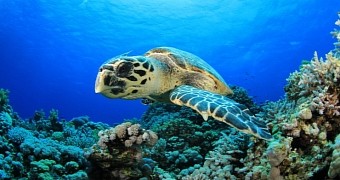Marine conservation organization Sea Shepherd is pleased to announce that, thanks to volunteers working closely with this environmental group, thousands of baby hawksbill sea turtles were given a fighting chance at life at sea.
Thus, the organization says that, during this year's nesting season, some 150 volunteers worked together to keep turtle moms and their nests on the Caribbean island of Utila safe from poachers.
It is estimated that, simply by patrolling beaches, these volunteers protected some 4,000 hawksbill eggs. Of these, about 3,600 produced baby turtles that eventually left the island and headed for the ocean.
It's not easy being a hawksbill sea turtle
Presently, the International Union for Conservation of Nature considers the hawksbill sea turtle a critically endangered species. According to Sea Shepherd, just 8,000 females belonging to this species are currently left in the wild.
Each and every year, female hawksbill sea turtles visit the island of Utila in fairly large numbers. The marine creatures come here to breed, and they can each set up 2 or 3 nests containing as many as 200 eggs.
Over the past few years, many of the turtles visiting this Caribbean island looking to breed were killed by poachers interested in selling their meat and shells. Besides, their nests were plundered and their eggs sold as aphrodisiacs.
“Sadly, turtle meat and eggs are still part of the traditional Caribbean menu, despite being declared illegal by the Honduran government. Unfortunately, making it illegal to poach turtles, inadvertently creates a black market demand for them at the same time.”
“Hawksbills in particular, are at even greater risk due to their comparatively thinner shell, which makes them easy prey for predators, and also highly sought after for use in jewelry throughout the Caribbean,” Sea Shepherd explains.
A most successful nesting season
The marine conservation organization says that, thanks to the presence of volunteers on local beaches, not one hawksbill nest was plundered by poachers all throughout this year's breeding season. What's more, the turtle moms all returned safely to the sea after having laid their eggs.
As mentioned, it is estimated that, all in all, the Sea Shepherd volunteers helped safeguard about 4,000 eggs and made it possible for as many as 3,600 baby turtles to leave their nest and head for the ocean.
It is understood that the conservationists not only patrolled the turtles' nesting area, but also made sure to hide the nests and the turtle tracks they encountered. This made it impossible for poachers to go about their usual working agenda. More so since the volunteers also kept in touch with the local police at all times.
Not yet out of the woods
The bad news is that, although thousands of baby turtles were kept safe during this year's nesting season on the island of Utila, the species is not out of the woods. Simply put, chances are it will continue to be a critically endangered one for several years to come.
This is because just 1 of 1,000 sea turtle hatchlings belonging to this species is lucky enough to reach maturity and go on to birth a new generation, wildlife researchers explain.
Together with other environmental groups, Sea Shepherd argues that, if this species is to even stand a chance at escaping extinction, efforts need be made to protect not just their natural habitat in the ocean, but also their nesting areas.

 14 DAY TRIAL //
14 DAY TRIAL //